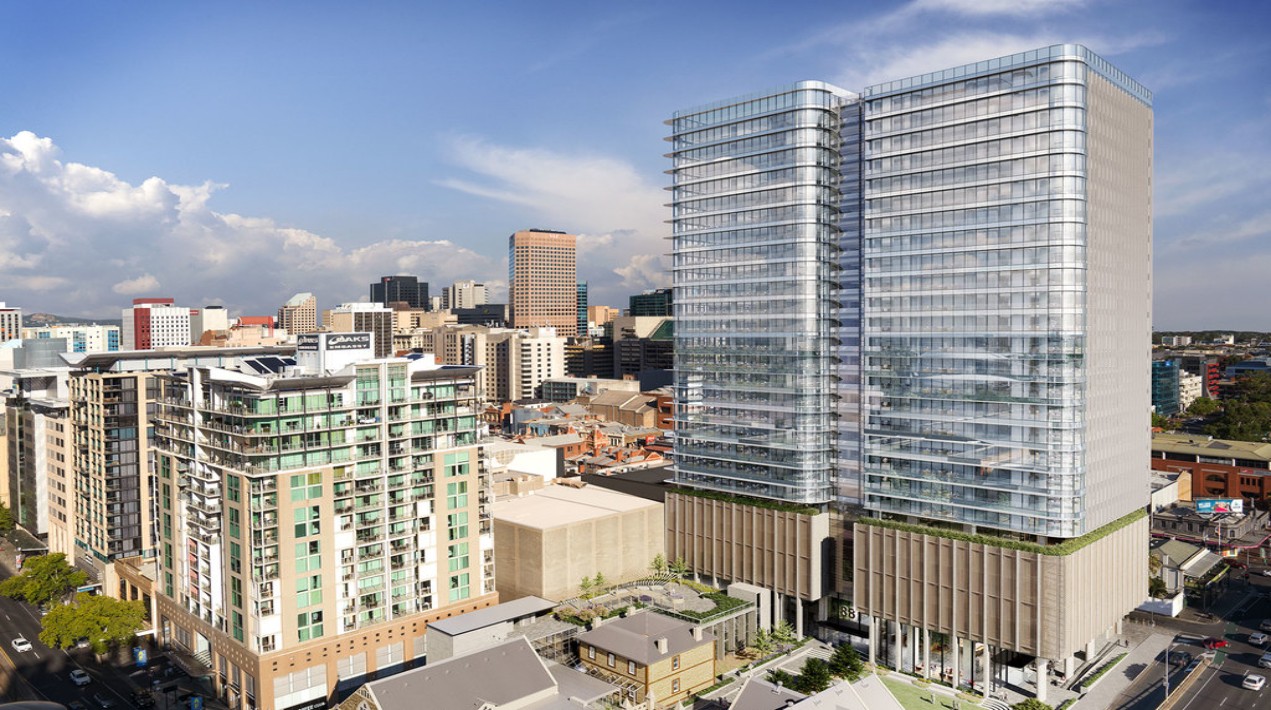
A new AU$450 million development, Trinity City, will be the bridge between the world’s most forward-thinking and innovative health and life sciences companies connecting to the world-class AU$3.8 billion Adelaide BioMed City, in the heart of the Adelaide CBD.
Creating 450 full-time jobs during construction, this world-class development will position the industry at the centre of an ecosystem that is harnessing world-leading hi-tech capabilities to accelerate research and the clinical application of data-driven precision medicine.
With the full support of Trinity Church, Trinity City will be constructed on land at 88 North Terrace in Adelaide, including major restoration to the National Trust-listed Trinity Church and two other local heritage buildings. The premium grade, 28-storey, 60,000sqm building, will offer 360-degree views and will be one of the largest buildings in South Australia.
Local firms will develop the landmark site, which will also include 173 EV-enabled car parks, a 70-place childcare centre and a 200-person auditorium. Trinity City will be a landmark on the Adelaide skyline and a key component of the Adelaide BioMed City precinct, one of the developers said. It will be Adelaide’s foremost new generation post-pandemic commercial tower and a symbol of Adelaide, as one of the most advanced health-focused cities in the world.
Meanwhile, the second developer stated that Trinity City will house over 3,000 staff enabling South Australia to accommodate and attract global companies looking to work side-by-side with the region’s expanding bio-medical expertise. Trinity City will assist in revolutionising and turbo-charging our health-tech economy.
Having undertaken extensive consultation on the redevelopment of the Trinity Church site with local and state government authorities and Heritage SA, construction on Trinity City is expected to commence in 2023, with completion earmarked for 2025.
The Adelaide BioMed City Board Chair stated that breakthroughs in healthcare will come from better understanding the patient and asking the right questions – turning health data into smart data will guide better health and medical decisions.
By combining the region’s long-established strengths in health data with rapidly growing capabilities in data analytics and AI, this vital investment in Trinity City will place Adelaide at the forefront of transforming healthcare through data and position us as a global place to come for data-driven personalised medicine, underpinned by the world-class biomedical infrastructure presented by the partners in Adelaide BioMed City.
Health technologies include things like medicines, vaccines, medical devices and tests. Digital health innovations, such as electronic health records and electronic prescriptions, are increasingly used to improve healthcare service access, transparency and personalisation.
Health technology is a broad term meaning something that is intended to do any of the following:
- prevent, diagnose or treat medical conditions
- promote health
- provide rehabilitation
- organise the delivery of health care.
Health technologies include:
- tests
- medical devices
- medicines
- vaccines
- blood products
- procedures
- programs or systems involved in health care.
Australians benefit from new health technologies and advancements in digital health as they:
- improve quality of life and patient outcomes
- support Australians to stay as well as possible
- make the healthcare system more efficient.
- Emerging health technologies and research
- Medical research plays a large part in the development and improvement of health technologies.
The Australian Government administers the Medical Research Future Fund (MRFF), an ongoing research fund set up by the Australian Government in 2015. The MRFF is already supporting many research initiatives.
















